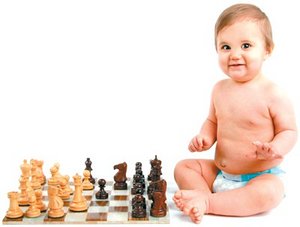Raising Baby Einstein
By Bill Reddy
Infant intelligence is a combination of heredity and environment. You want to give your child everything they need to excel in life. But are videos and modern toys boosting your baby's IQ? Here are a few ways to raise a smart baby.
Pregnancy is a time of great expectation, of new beginnings and the excitement of bringing life into the world. Wouldn't it be nice to know some of the latest techniques from clinical neurobiology to potentially increase the IQ of your unborn child?
What Is IQ?
First of all, what exactly is IQ? It stands for Intelligence Quotient, and is your mental age divided by your chronological age (x100). An 8-year-old child whose mental age is also 8 has an IQ of 100, which is considered average. An IQ test typically measures verbal, spatial and quantitative/analytical ability. The "quotient" was the original way intelligence was defined, but more advanced tests and statistical methods are used today. Recent studies have shown that IQ is not a fixed numerical value diminishing with age, but rather one that is "plastic" or variable depending on the intellectual stimulation of the individual.
 Preconception care in America is aimed at reducing risk of birth defects and disease - not maximizing the intellectual potential of your unborn child. We can increase our IQ as we age by challenging ourselves with new skills, such as learning a new language or taking piano lessons. (Of course, having an intelligent spouse is also a great leap forward in producing a gifted child.) This article will focus on prenatal nutrition, supplementation and lifestyle changes to maximize your child's intelligence.
Preconception care in America is aimed at reducing risk of birth defects and disease - not maximizing the intellectual potential of your unborn child. We can increase our IQ as we age by challenging ourselves with new skills, such as learning a new language or taking piano lessons. (Of course, having an intelligent spouse is also a great leap forward in producing a gifted child.) This article will focus on prenatal nutrition, supplementation and lifestyle changes to maximize your child's intelligence.
Healthy Parents Make Healthy Babies
The most critical element in a newborn's health is the overall health of the parents. Maternal health is addressed in the majority of medical literature, but poor paternal health and subsequent sperm quality can compromise the future mental health of a child, increasing the probability of schizophrenia, autism and Down syndrome. A common-sense approach would be for the mother and father to eliminate smoking, caffeine, drug and alcohol use, and reduce the mother's exposure to heavy metals, solvents, cleaning products, MSG, aspartame and processed foods leading up to and during pregnancy. An organic diet for both parents would be the optimal way to go.

